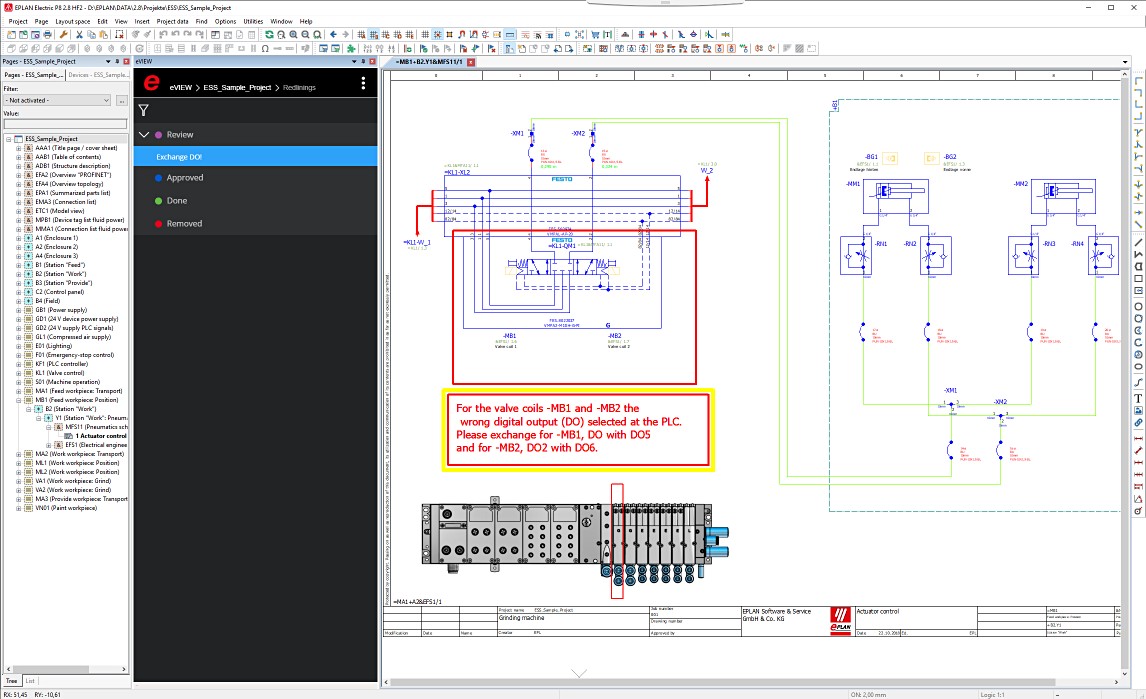Author
 John Boynton
John has worked for EPLAN for 24 years and is our Technical Business Manager. A member of The Institute of Engineering & Technology, and The Engineering Council for over 20 years, John has a wealth of experience and skills ranging from analysing customers' processes in order to identify areas in which could be made more efficient, to project management, consultancy, method counselling and project commissioning.
boynton.j@eplan.co.uk
John Boynton auf LinkedIn
John Boynton
John has worked for EPLAN for 24 years and is our Technical Business Manager. A member of The Institute of Engineering & Technology, and The Engineering Council for over 20 years, John has a wealth of experience and skills ranging from analysing customers' processes in order to identify areas in which could be made more efficient, to project management, consultancy, method counselling and project commissioning.
boynton.j@eplan.co.uk
John Boynton auf LinkedIn
Working remotely: building the new normal
The transition to remote working
A recent survey in the USA revealed that almost three-quarters (72.4%)[1] of employees reported that they had some difficulty in making the transition to working from home, mainly due to the technical problems encountered. Added to these frustrations are the challenges of juggling childcare and home-schooling, looking after vulnerable or sick members of the family and attending to domestic duties during lockdown. All of these concerns are further compounded by the worries of living through a fully-fledged pandemic in an economy that is floundering.
Deloitte, a company specialising in remote solutions, noted that working remotely under these circumstances means “adapting to a new environment, battling a new set of distractions as well as experiencing an unprecedented fusion of work and private life”[2]. To continue working efficiently and create value under these new circumstances, organisations need to understand, accept and support their employees’ specific challenges.
For manufacturing companies, remote working comes with an added set of challenges, as site teams no longer have immediate and direct access to engineers who are now working remotely. However, having efficient collaboration tools in place to streamline work and reduce intrusions are both necessary in current circumstances.
The digital revolution: improving efficiencies, communication and collaboration
At EPLAN we firmly believe that corporate social responsibility and profitability are not mutually exclusive. With free tools such as EPLAN eVIEW, engineers, maintenance engineers, sales executives and operations managers can work collaboratively and remotely. The digital revolution makes possible greater efficiencies and faster communications between departments, while at the same time greatly decreasing the carbon footprint of businesses. In short, everyone who needs information can access it without the need to travel or to print documents.

Easy to use redlining function in EPLAN eVIEW.
This approach can enable engineering companies to balance individual needs, an effective working environment and collaboration requirements, when setting up the “new” office. In terms of economic benefits, the new digital platforms facilitate knowledge-sharing and enhance learning opportunities.
The Internet of Things and the wide availability of cloud-based engineering platforms, typified by EPLAN eVIEW and EPLAN eBUILD, represent important opportunities for businesses seeking to build an effective response to the new environment. These dedicated engineering platforms are complemented by tools such as Google Docs, Microsoft Teams, Slack and Monday, making it possible to produce a working environment that maintains the benefits of close collaboration, even when team members are geographically apart.
Another important element of the post-pandemic remote-working office is that many employees are upskilling and seeking out training to learn new skills, which enables them to adapt to their new working environment. But the truth is that even before the current crisis, emerging technologies and new working strategies were disrupting workplaces and changing the skills employees needed to do them.
Automation and artificial intelligence continues to rise
A McKinsey Global Institute study from 2017 estimated that 14%[3] of the global workforce would have to switch occupations or acquire new skills by 2030 because of the rise of automation and artificial intelligence. The same organisation has now found that 87%[4] of executives said they were experiencing skill gaps in the workforce or expected them within a few years. Yet less than half of respondents had a clear sense of how to address the problem – companies simply need to change from analogue to digital processes.
The Covid pandemic has shown organisations that there is an urgent need to shift their working strategies. To overcome the issues revealed by the crisis, companies must commit to a tactical approach that develops digital and cognitive capabilities of their staff, their social interaction skills, their adaptability and their resilience. Now is the time for companies to increase their levels of digitalisation, invest in collaborative cloud-based platforms and commit to upskilling their employees at all levels in preparation for the new world ahead.
Tools are already available to help equip engineers and businesses in navigating the new normal. For more information and to get free access to EPLAN’s cloud-based collaboration tool please visit epulse.com.
[1] https://www.fluxon.com/insights/study-evolving-opinions-on-working-from-home
[2] https://www2.deloitte.com/content/dam/Deloitte/de/Documents/human-capital/Remote-Collaboration-COVID-19.pdf
[3] https://www.mckinsey.com/featured-insights/future-of-work/jobs-lost-jobs-gained-what-the-future-of-work-will-mean-for-jobs-skills-and-wages
[4] https://www.mckinsey.com/business-functions/organization/our-insights/beyond-hiring-how-companies-are-reskilling-to-address-talent-gaps

.png)

Comments